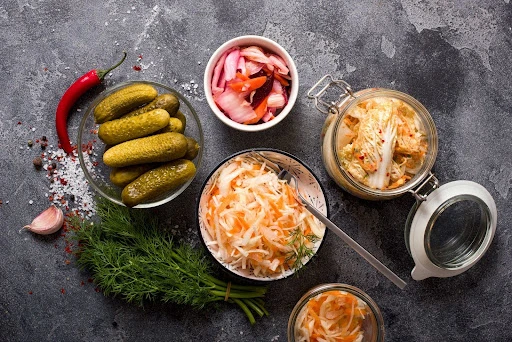What’s the one thing that keeps your brain calm, your focus sharp, and your nerves from feeling frayed?
Hint: It’s not another cup of coffee or a meditation app. It’s something your body already produces—a little molecule called GABA.
And the best part? You can supercharge it naturally with the foods you eat.
GABA, or gamma-aminobutyric acid, is like the Zen master of your brain. It’s a neurotransmitter that helps quiet the mental chatter, slows down nerve activity, and promotes relaxation.
Imagine you’re in a noisy room, and GABA is the one gently dimming the lights and turning down the volume. Without it, life can feel overwhelming—cue stress, anxiety, sleepless nights, and for some, even tinnitus.
Low GABA levels can leave you feeling frazzled and unable to focus. But here’s the good news: You can naturally boost GABA production by tweaking your diet.
Whether you’re managing tinnitus or just trying to stay ahead of life’s demands, GABA-boosting foods can make a world of difference.
Why GABA Matters for Everyone

Think GABA is only for people dealing with tinnitus or anxiety? Think again. While it’s true that GABA can help filter out the noise—both literal and mental—it’s also a game-changer for anyone looking to feel calmer, more focused, and emotionally resilient.
Whether navigating a busy workday, chasing after kids, or juggling life’s curveballs, your brain can always use a little extra GABA.
And for those already taking a supplement like Zeneara to address tinnitus, adding GABA-boosting foods can amplify its effects. But even if tinnitus isn’t your battle, these foods are your ticket to better mental health and sharper focus.
The GABA-Boosting All-Stars

Ready to put GABA on your side? Here’s your guide to foods that naturally increase this calming neurotransmitter:
Fermented Favorites: Yogurt, kimchi, sauerkraut
These foods, packed with probiotics that support gut health, encourage your body to produce more GABA. Bonus: A healthy gut equals a happier mind.
Leafy Greens: Spinach, kale, Swiss chard
These greens are rich in magnesium, which is essential for GABA production. They help keep the brain calm and steady.
Nutty Nutrition: Almonds, walnuts, sunflower seeds
Loaded with B6 and magnesium, nuts and seeds make for brain-boosting snacks.
Whole Grains: Brown rice, quinoa, oats
Complex carbs provide steady energy and promote GABA activity, keeping your brain balanced throughout the day.
Dark Chocolate: 70% cocoa or higher
Flavonoids in dark chocolate enhance blood flow and support neurotransmitter health. Plus, it’s a delicious way to calm your nerves.
Bananas
Naturally rich in GABA and potassium, they’re the ultimate grab-and-go brain food.
Herbal Teas: Chamomile, valerian root
Known for their calming properties, these teas naturally support GABA and help you unwind.
Legume: Lentils, chickpeas
High in glutamic acid, a precursor to GABA, these plant-based powerhouses keep your brain firing on all cylinders.
Citrus Fruits: Oranges, lemons
Packed with flavonoids, citrus fruits support GABA receptor activity, brightening your day and brain.
Fatty Fish: Salmon, mackerel
Rich in omega-3s, they help regulate brain function and complement GABA’s calming effects.
Easy Ways to Add GABA-Boosting Foods to Your Day
Morning Calm: Start your day with a smoothie made from banana, spinach, almond milk, and yogurt.
Snack Smart: For a mid-day boost, keep a stash of nuts or a square of dark chocolate on hand.
Evening Reset: Brew a cup of chamomile tea to wind down before bed.
These simple changes boost your GABA levels and nourish your overall well-being.
While boosting GABA is particularly beneficial for those managing tinnitus, its effects go far beyond that.
Imagine feeling more relaxed during stressful moments, sleeping better, and focusing more easily on what matters most. That’s the power of GABA—it’s like hitting a mental reset button, whenever you need it.
What’s your GABA strategy?
Have you tried any of these foods before? Or do you have a go-to recipe that helps you stay calm and focused?
Share your tips in your reply. I’d love to hear how you use nutrition to boost your brainpower or manage tinnitus.





